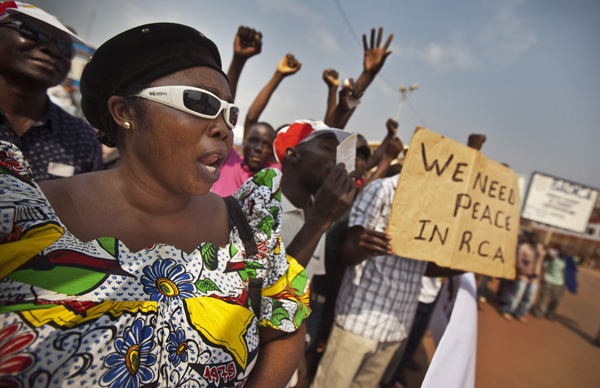
After a month-long standoff, the Central African Republic government and a rebel alliance agreed upon a peace deal to end an uprising that threatened to spark a humanitarian crisis and un-seat President François Bozizé. The coup attempt began on December 10 and had since come within 45 miles of the capital of Bangui, threatening the 700,000 residents living in the city. Over the month of fighting, the rebels took over key mining areas in the country, destroyed hundreds of homes, and displaced thousands of civilians. UNICEF said that the rebels have forcibly recruited children to fight and serve as porters and sex slaves.
The days leading up to the negotiation talks between the CAR government and the Seleka rebels were filled with uncertainty around the prospect of coming to a peace agreement. Bangui signed many agreements in years past with various rebel groups. In late 2012, Seleka was born out of frustration that a previous peace agreement signed in 2007 was never honored.
“Failure to go further to discuss the reasons for the lack of implementation of previous agreements and to correct these may lead to another meltdown, a few years down the line again, as a result of lost expectations and frustrations,” warned U.N. special envoy to Central African Republic Margaret Vogt after the signing of the latest agreement.
Seleka, which means ‘alliance’ in a local CAR language called Sango, is made up of four separate groups that have history of fighting one another. Analysts suggest President Bozizé is attempting to fragment the rebel group by accepting the moderate conditions of the peace agreement while disregarding one faction’s calls for him to step down as president. If Seleka is successfully partitioned, an advance on the capital is much less likely. Bozize’s current term ends in 2016.
The new agreement between the government of the Central African Republic and the Seleka rebels mandates a prime minister must be chosen from the opposition to lead a government of national unity with President Bozizé. In 2016 when their terms end, both candidates will not be permitted to run for re-election. During this transitional period, the rebels have agreed to pull out of territories they currently occupy in northern CAR.
Despite the hundreds of miles separating Seleka controlled towns and the operation to hunt the Lord’s Resistance Army in the Central African Republic, news of this ceasefire agreement was well-received by Ugandan and U.S. forces involved in operations to end the notorious rebels that have operated in CAR since 2008. CAR troops who had previously joined the hunt for Joseph Kony and the LRA in small numbers abandoned the mission late last month to reinforce Bangui against the rebel group. While spokesmen for the U.S. Embassy in Uganda and the Uganda People’s Defense Forces, or UPDF, said the insurgency in CAR had no effect on the mission to track down the LRA, both expressed relief that their mission will go uninterrupted by outside fighting. “The UPDF is operating in the CAR with the permission of the CAR government and as far as we know, they will continue operating there for the foreseeable future,” said Daniel Travis, spokesman for the U.S. Embassy in Uganda.
While the anti-LRA operations may be continuing unaffected by the unrest in CAR, the instability and uncertainty surrounding the strength of the peace agreement could potentially cause problems for the UPDF and U.S. military advisors. If the agreement is not implemented or if the rebels do not give up control of the towns they conquered, the transitional government could falter. This possible continuation of insurgency could become a problem for the U.S. military advisors and might force out Ugandan troops from tracking the LRA in CAR.
As of Tuesday, January 15 the opposition announced they chose Nicolas Tiangaye to head the government of national unity as prime minister. It remains to be seen if Tiangaye and Bozizé can come together and spearhead a lasting peace in CAR.
Photo: Protesters gather in Bangui to call for peace ahead of negotiations between the government and rebels in December 2012 (AP)

